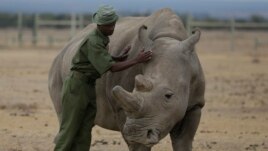30 January 2024
Scientists in Berlin announced recently the first successful embryo transfer in a white rhinoceros.
The transfer, which occurred in a southern white rhinoceros, offers hope for saving the northern white rhino from completely dying off.
Two kinds of white rhinoceros

FILE - Keeper Zachariah Mutai attends to Fatu, one of only two northern white rhinos left in the world, in the pen at the Ol Pejeta Conservancy in Laikipia county in Kenya. (AP Photo/Sunday Alamba, File)
The white rhinoceros includes two different subspecies, the northern and the southern. The last male northern white rhino died in 2018. Only two female members of the subspecies remain. Neither of them can carry a baby.
Southern white rhinos are more numerous.
Researchers hope to use eggs and sperm from northern white rhinos to produce embryos that will be put into southern white rhino surrogate mothers.
A surrogate is something that performs the duties of something else.
To test the plan, scientists said they transferred the embryo of a southern white rhino into a surrogate southern white rhino mother at the Ol Pejeta Conservancy in Kenya on September 24, 2023.
However, the research team only learned of the pregnancy after the surrogate mother died of a bacterial infection in November 2023. The embryo was discovered during an examination of the body after death.
Even with the death, researchers found reasons to be hopeful.
The international BioRescue team, a group backed by the German government, confirmed recently that the operation had produced a successful pregnancy of 70 days, with a well-developed 6.4-centimeter-long male embryo.
"We achieved together something which was not believed to be possible," said Thomas Hildebrandt of the Leibniz Institute for Zoo and Wildlife Research.
"That is really a milestone to allow us to produce northern white rhino calves in the next two, two and a half years," Hildebrandt said.
Too late?
The northern white rhinoceros subspecies has only two known examples left in the world. The Ol-Pejeta Conservancy in Kenya says that Najin, a 34-year-old, and her 23-year-old offspring, Fatu, both cannot naturally reproduce.
In 2018, the last male white rhino, Sudan, was 45 when he was euthanized because of age-related problems. He was Najin's father. Scientists stored his semen and that of four other dead rhinos.
Some conservation groups have argued that it is probably too late to save the northern white rhino using the method known as in vitro fertilization.
The species once lived in Chad, Sudan, Uganda, Congo and Central African Republic, but human conflict has caused the creature to disappear. Critics say the efforts made to save the northern white rhino should instead go to save at-risk species that have a better chance to survive.
About 20,000 southern white rhinos remain in Africa. That subspecies and another species, the black rhino, are increasing in number after illegal hunting nearly caused their disappearance.
I'm John Russell.
John Russell adapted this story from AP and Reuters report.
________________________________________________
Words in This Story
transfer – v. to move something from one place to another
subspecies – n. a group of related plants or animals that is smaller than a species
achieve –v. to do something that you were trying to do
milestone – n. an important point in the progress or development of something
euthanize – v. to put to death in a humane way
in vitro –adj. (scientific) taking place in a laboratory or outside of normal biological methods